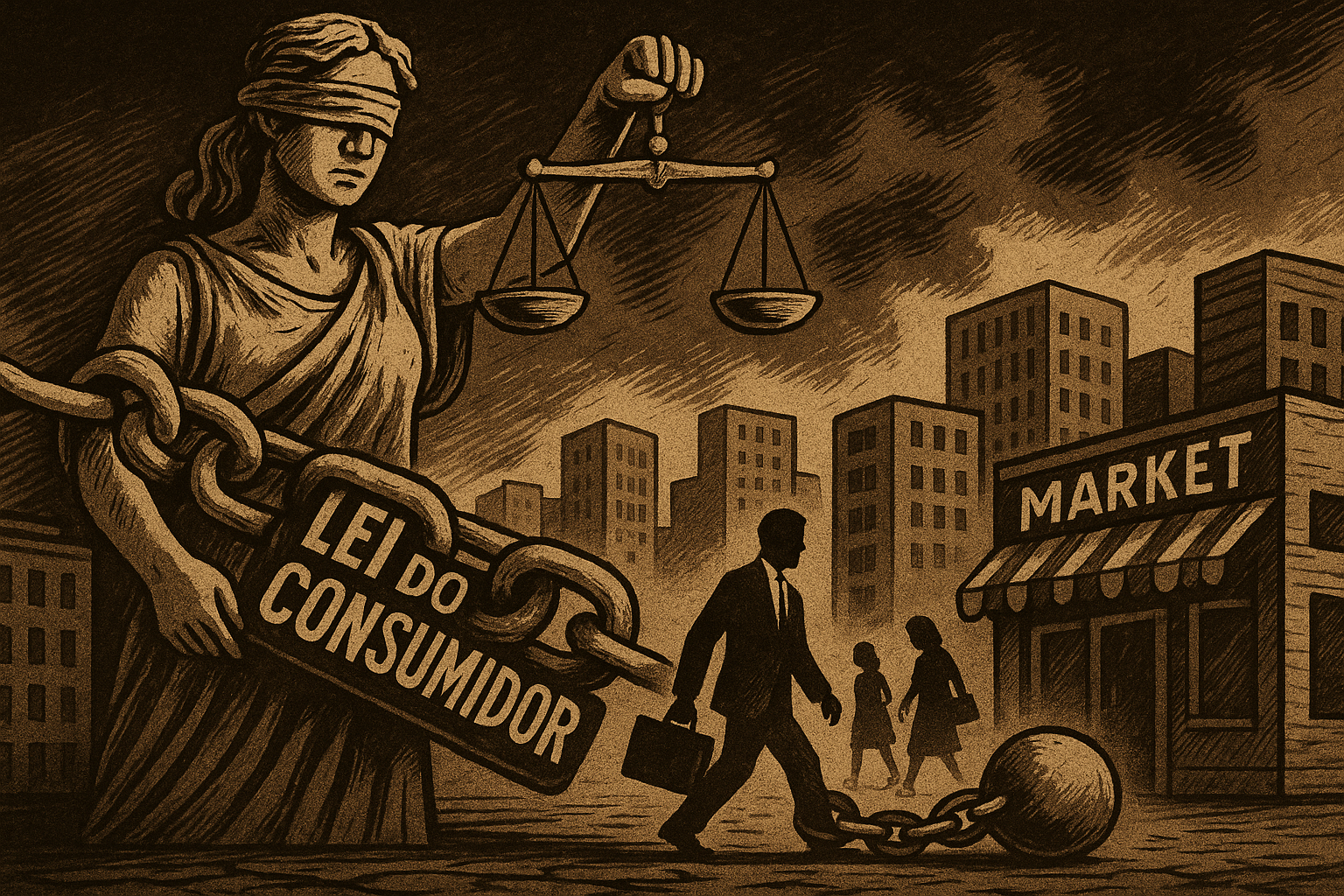The rhetoric of consumer protection has become ubiquitous in Brazil. Any attempt to question rules, limits or regulations is quickly framed as an “attack on citizens’ rights”. However, the political use of this legislation — originally designed to balance asymmetries between supplier and customer — reveals a dangerous distortion: Consumer law has often come to function as a weapon against the market itself.
It makes services more expensive, makes small entrepreneurs unviable, stifles innovation and transfers power to the bureaucracy and large groups that have learned to use the State as a shield against competition.
Before delving into this debate, it is worth revisiting two reflections already published here on the blog. The first deals with the way in which the State uses regulation to protect inefficient sectors from real competition — see the article The Regulation Fetish. The second shows how bureaucracy has become an obstacle to innovation, especially for small entrepreneurs — find out more at Entrepreneurship in Brazil: where bureaucracy is the biggest competitor.
In this article, we will show how the discourse of protection has become a control mechanism, how poorly designed regulation harms development and why consumer protection has become a justification for maintaining privileges and inefficient state structures.
The rhetoric of protection and the practice of coercion
It’s not hard to find examples. A local bakery that wants to sell takeout meals must comply with health and regulatory requirements that consume time and money. An informal mechanic, even with a good reputation, is fined for not having a “visible sign” for customer service. A technology company cannot launch a new service before complying with all the local Procon standards, even if it has voluntary approval from its customers.
These are not isolated cases. They are symptoms of a system that has become using consumer protection as a justification for maintaining a closed, insecure economic environment that is hostile to freedom of choice.
The trap of well-intentioned regulation
According to the column Law and Economics from the magazine Look, the excess of laws and regulations, even when well-intentioned, ends up create a legal and institutional environment inhospitable to innovation. Entrepreneurs start spending more on lawyers than on development. Innovative services are no longer launched for fear of lawsuits. And consumers lose what they should have most: alternatives.
“By hindering the emergence of innovative business models, protective legislation can end up preventing consumers from having access to better products and services at more competitive prices.”
— Veja – Disguised Protectionism and the Innovation Trap
The article warns: it is not the market that is becoming hostile to the consumer. It is the law that, in trying to protect the consumer from everything, prevents him from choosing for himself.
What IPEA says: poorly designed regulation affects growth
The Institute of Applied Economic Research (IPEA) has published an extensive study on the effects of regulation on development. Chapter 6 of the book Institutions and Development in Brazil analyzes how regulatory governance in the country has created barriers to productivity, investment and free enterprise.
Some key points of the study:
- Excessive cost: Poorly designed regulations impose unnecessary costs on businesses, making it difficult to operate and expand.
- Reduction of competition: excessive legal requirements restrict the entry of new agents into the market, favoring monopolies and cartels.
- Negative impact on growth: Poorly designed regulations reduce investment and inhibit innovation, holding back the economy.
- Lack of regulatory impact analysis: many laws are made without measuring their practical effects, which generates permanent institutional distortions.
The OECD report itself, cited in the study, is emphatic:
“If poorly designed, regulation creates a cost to entrepreneurs and citizens and acts as a brake on competition, growth and investment.”
Source: IPEA – Chapter 6: Regulatory governance and development. 2020.
Regulation as a barrier to entry
Behind the protection discourse, there is a reality that few have the courage to admit: regulation has become an instrument to keep the big guys at the top and the little guys out of the game.
If a large supermarket chain can hire a legal team and comply with every detail of consumer legislation, a self-employed trader or a small business cannot. The cost of operating within the law becomes, in itself, a factor of economic exclusion.
That's the irony: In the name of equality, the legal system creates inequality.
When Procon defines the business model
The Brazilian model of consumer regulation transforms entities such as Procon into true judges of the corporate structure. Companies need to anticipate how they will be interpreted by consumer protection agencies before launching a product. This generates prior censorship, legal uncertainty and a decline in entrepreneurship.
Instead of protecting the real consumer — the one who can research, compare, evaluate and reject products — the system assumes that the citizen is incapable, passive and dependent on state protection.
It is the infantilization of the consumer and the demonization of freedom of choice.
The consumer who cannot choose
Protection without freedom is not protection—it is control. When the state limits what services are authorized, defines what is “abusive” based on political criteria, and imposes one-size-fits-all standards for different sectors, it is making decisions for you.
The result is a tragic paradox: in the name of the consumer, the very market that offers them options is destroyed.
The discourse of protection as an instrument of domination
By controlling the rules of the game and positioning itself as the consumer’s guardian, the State creates a relationship of dependency. And once this relationship is consolidated, any questioning becomes an “attack on rights.”
It is no coincidence that many consumer protection agencies resist the digitalization of contracts, the decentralization of payments, financial innovation and free negotiation between parties. The more citizens act on their own, the less the State is needed — and this is unacceptable for those who profit from dependence.
What to do? The path to freedom with responsibility
This does not mean defending a wild market, without any regulation. But rather defend lean, transparent regulation, with prior impact analysis and a focus on citizens’ freedom of choice.
- More freedom to innovate
- Less bureaucratic obstacles
- Systematic review of useless regulations
- Protection of competition, not the power structure
Conclusion: protect the consumer or protect the privilege?
Consumer protection is essential. But when it is used to build a regulatory apparatus that favors already established groups, punishes innovation and infantilizes citizens, it ceases to be protection and becomes a hoax.
There is no consumer protection without freedom of choice. And there is no freedom without an open, dynamic and competitive market.
It's time to ask: Are we protecting the consumer — or protecting the system owners?
Read also: the article Billion-dollar subsidies, popular inflation: the (in)visible bill of “state aid”, which shows how the rhetoric of protection serves to concentrate power, and the text The Real Scam: How We Destroyed the Value of Our Own Currency, which denounces how the State manipulates the economy and the currency under the pretext of stability.
📩 Do you want to understand how well-intentioned laws are undermining economic freedom in Brazil?
Subscribe to the newsletter Economic Radar and receive weekly analyses on politics, the market and behind-the-scenes legislation.
🔗 References
- Veja – Disguised Protectionism and the Innovation Trap
- IPEA – Institutions and Development in Brazil: Diagnostics and a research agenda for public policies. Chapter 6: Regulatory Governance and Development. 2020.


